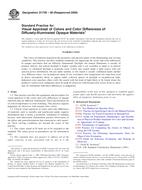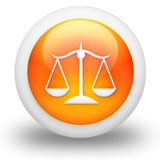Potrebujeme váš súhlas na využitie jednotlivých dát, aby sa vám okrem iného mohli ukazovať informácie týkajúce sa vašich záujmov. Súhlas udelíte kliknutím na tlačidlo „OK“.
ASTM D1729-96(2009)
Standard Practice for Visual Appraisal of Colors and Color Differences of Diffusely-Illuminated Opaque Materials
Automaticky preložený názov:
Štandardné Practice for Visual oceňovanie farieb a farebných rozdielov v difúzne osvetlenej nepriehľadné materiály
NORMA vydaná dňa 1.12.2009
Informácie o norme:
Označenie normy: ASTM D1729-96(2009)
Poznámka: NEPLATNÁ
Dátum vydania normy: 1.12.2009
Kód tovaru: NS-18189
Počet strán: 4
Približná hmotnosť: 12 g (0.03 libier)
Krajina: Americká technická norma
Kategória: Technické normy ASTM
Kategórie - podobné normy:
Anotácia textu normy ASTM D1729-96(2009) :
Keywords:
color, color difference, color matching, lighting, viewing conditions, visual examination´color, visual examination´color difference, Visual examination--paints/related coatings/materials, Color--paints/related coatings/materials, Color difference measurements, Diffuse light transmission, Geometric analysis--paints/related coatings/materials, Latex paints, Light transmission and reflection, Opacity/opaque materials, Radiometers, Spectral data--paints/related coatings
Doplňujúce informácie
| Significance and Use | ||||||||||||||||||||
|
Although color measuring instruments are widely used, color matches are usually checked visually. The standardization of visual examination has greatly improved the uniformity of products and the accuracy of color matches. The use of this practice is essential for critical color matching but is also recommended for any color appraisal, such as the choice or approval of a color. This practice is widely used in industry to choose colors, exhibit colors reproducibly, inspect incoming materials, monitor color producing processes, and inspect finished goods. Visual appraisal is particularly important when the product inspected is not of the same material as the color standard to which it is compared. Observers—This practice is based on the fundamental assumption that the observer has normal color vision and is trained and experienced in observing and classifying color differences. The significance of the results depends on that being so. The selection, evaluation, and training of observers are treated in Guide E1499. Illumination—Simulated average daylight is recommended by the International Commission on Illumination (CIE), but a slightly bluer simulated north-sky daylight came into widespread use in North America, because it provides a slightly greater distinction between very pale yellow and white, a distinction of great commercial importance. |
||||||||||||||||||||
| 1. Scope | ||||||||||||||||||||
|
1.1 This practice specifies the equipment and procedures for visual appraisal of the colors and color differences of opaque materials that are diffusely illuminated. These specification are of critical importance in color matching. This practice requires judgments by observers with normal color vision. 1.2 Critical visual appraisal of colors and color differences of materials such as metallic and pearlescent paints requires illumination that is nearly a geometric simulation of sunlight, because such directional illumination permits observation of the glitter and goniochromatism that characterize such materials. Such viewing conditions are beyond the scope of this practice. 1.3 The values stated in SI units are to be regarded as the standard. The values given in parentheses are for information only. 1.4 This standard does not purport to address all of the safety concerns, if any, associated with its use. It is the responsibility of the user of this standard to establish appropriate safety and health practices and determine the applicability of regulatory limitations prior to use. |
||||||||||||||||||||
| 2. Referenced Documents | ||||||||||||||||||||
|
Odporúčame:
Aktualizácia zákonov
Chcete mať istotu o platnosti využívaných predpisov?
Ponúkame Vám riešenie, aby ste mohli používať stále platné (aktuálne) legislatívne predpisy
Chcete vedieť viac informácií ? Pozrite sa na túto stránku.




 Cookies
Cookies
